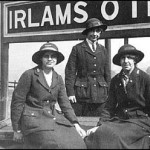Prostitution and the Contagious Diseases Acts (1864, 1866 and 1869)
Table of Contents
Overview
The passing of the Contagious Diseases Acts, which stripped poor and working-class women of their rights, shocked many respectable middle class women and provoked a major campaign for repeal. The Acts were a legal embodiment of the Victorian sexual double standard and, according to their critics, sanctioned male lust and forced vulnerable women into a life of state registered prostitution to service it.
The first Contagious Diseases Act was passed in Britain in 1864 and was, to an extent, modelled on the European (French) system of regulated prostitution. It operated in an area surrounding 11 army camps and naval ports, and was designed to stop the spread of sexually transmitted diseases. It allowed for the forcible registration and regular internal examination of women suspected of being prostitutes. Those found to be diseased were detained for periods of up to 3 months (later extended) in a secure lock hospital.
This (temporary Act) was replaced by a new Act in 1866 which added 2 more towns in the South to the number of subjected towns, and introduced the enforcement of fortnightly examinations of prostitutes. In the autumn of 1869 a third act was passed, extending its remit to cover 18 towns in the UK, and prolonging the imprisonment of diseased women from 6 to 9 months.
After a long and sophisticated campaign of some sixteen years, led by Josephine Butler and the Ladies National Association for the Repeal of the Contagious Diseases Acts, the Acts were suspended in 1883 and repealed in 1886.
How the Contagious Diseases Acts worked
The Acts were administered by groups of plain clothed policemen (who became known as the ‘spy police’) whose job was to keep women in their area under surveillance. They harassed prostitutes and working-class women, many of whom were vulnerable and illiterate, with no knowledge of their legal rights. Any woman could be identified as a ‘common prostitute’ by one of these policemen and then forcibly subjected to a fortnightly internal examination. If found suffering from gonorrhoea or syphilis, she would be interned in a secure, certified lock hospital (a hospital with special venereal wards) for up to 9 months. Under these laws, any woman in designated military towns could be forcibly inspected for venereal disease. (It was decided that soldiers/sailors and other men should not be examined because they would not accept it.)
The definition of ‘common prostitute’ was vague and this gave the police real power. There were instances of women who were not prostitutes undergoing the ordeal of examination (‘rape by speculum’) and subsequently being forced into the sex trade as, to all intents and purposes, she would have lost her respectability and with it her choice. Poor women were particularly at risk as they, unlike a middle or upper class woman, could not afford to always travel in a carriage or with a chaperone. Women accosted were presumed guilty; if they would not comply with an examination they had to go before the magistrate to try and prove their virtue. The female body, not the men they serviced, was identified as the primary source of disease and prostitution. As the men were not checked, the Acts were futile in preventing spread of disease.
The campaign for repeal
The campaign against the Contagious Diseases Acts was waged by the Ladies National Association led by Josephine Butler. Josephine was told of the horrors of the fortnightly examinations:
It is awful work; the attitude they push us into first is so disgusting and so painful, and then these monstrous instruments – often they use several. They seem to tear the passage open first with their hands, and examine us, and then they thrust in instruments, and they pull them out and push them in, and they turn and twist them about; and if you cry out they stifle you.
In the lock hospitals, women were treated very harshly too. Women who refused to be examined were locked up. In brothels women had to have tickets with their number, signed by the examining surgeon, showing they were free of disease, which they then showed to the soldiers/punters. Josephine was told by a prostitute in Canterbury, who had chosen to go to prison rather than submit to the examination, that it was unfair because the magistrate who committed her to prison had paid her several shillings to go with him a few days before. Josephine discovered that this was not an isolated case.
There were many supporters of the Acts however who wanted to extend their powers to regulate the entire civil population – or at the very least London – and to adopt fully the European system of licensed prostitution. In 1867 the Association for Promotion of the Contagious Diseases Act of 1866 to the Civil Population was formed, supported by The Lancet. The Home Secretary, Henry Austin Bruce, proposed such a bill in 1872. This would have stripped every woman in the kingdom of her civil rights in order that men might ‘sin with impunity’.
Arguments against the Acts
Other doctors spoke out against the Acts however, arguing that they were immoral, that forced examination was degrading to women, and that it was unjust that only women were examined. Josephine Butler and the Ladies National Association argued for repeal of the Acts from several standpoints:
- A moral argument, the law was treating women with severity while allowing men to sin with impunity
- The Government was waging an equal war on the weaker sex only
- The Acts persecuted working class women, limiting their freedom of movement (if you could afford to travel in a carriage at night you were safe from suspicion)
- Women’s rights were being taken away to create a sub-class without rights.
- The Act did not define ‘common prostitute’: any woman could be suspected, and no difference was made between an unchaste woman and a criminal
- Women were presumed guilty until proved innocent
- The political liberty of the whole nation ‘depends on the preservation of the rights of all’.
Their campaign strategy involved holding public meetings in working class areas, organising petitions and offering legal and family support to women caught by the Acts. The sexual double standard embodied in the Acts was made plain by Josephine Butler and the Ladies National Association who argued that the State regarded prostitution as a necessity yet condoned male vice. Only women were forced to undergo the degrading examination and only women were denied their civil rights until they were proved to be free from disease. Had God really created a class of women solely for the use of profligate men – or intended that working-class women were to minister to the sexual needs of gentlemen ?
After a long campaign of some sixteen years the anti-campaign was finally successful and the Contagious Diseases Acts were suspended in 1883 and finally repealed in 1886.
References and further reading
Judith Walkovitz, Prostitution and Victorian Society (Cambridge University Press, 1982)![]()










[…] ‘Prostitution and the Contagious Diseases Acts (1864, 1866 and 1869)’, HerStoria [Available at http://herstoria.com/?p=459%5D [Accessed […]
[…] Claire Jones, ‘Prostitution and the Contagious Diseases Acts (1864, 1866 and 1869)’, HerStoria, 5 July 2012 - http://herstoria.com/?p=459 […]